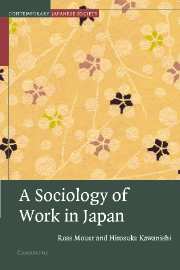Book contents
- Frontmatter
- Contents
- List of figures
- List of tables
- Preface
- Note on transliteration, romanization, and translation
- List of abbreviations
- Part I A context for studying work
- Part II The commitment to being at work
- 4 Hours of work, labor-force participation and the work ethic
- Part III Processing labor through Japan's labor markets
- Part IV The broader social policy context for understanding choice at work in Japan
- Part V The power relations shaping the organization of work in Japan
- Part VI The future
- References
- Author index
- General index
4 - Hours of work, labor-force participation and the work ethic
Published online by Cambridge University Press: 03 December 2009
- Frontmatter
- Contents
- List of figures
- List of tables
- Preface
- Note on transliteration, romanization, and translation
- List of abbreviations
- Part I A context for studying work
- Part II The commitment to being at work
- 4 Hours of work, labor-force participation and the work ethic
- Part III Processing labor through Japan's labor markets
- Part IV The broader social policy context for understanding choice at work in Japan
- Part V The power relations shaping the organization of work in Japan
- Part VI The future
- References
- Author index
- General index
Summary
How hard do the japanese work?
Well into the 1990s many foreigners and Japanese alike perceived that the Japanese were working harder than their counterparts in other advanced economies. This view was held not only by critics of Japan (who felt that Japanese worked too much), but also by advocates of the Japanese model who saw in long hours of work enviable levels of commitment to an employer. Many who associated long hours of work with high levels of motivation saw in Japan an approach to management that would take human resource management in Japan and other advanced societies into the twenty-first century.
Most assessments of how hard the Japanese work are implicitly comparative. To the extent that Japanese workers are perceived as working very hard, workers overseas come to be seen as not working hard enough. Lincoln and Kalleberg (1996) cite the short working hours of German employees as a major concern for Japanese managers stationed in that country. Japanese managers in Australia have been quick to fault Australians for not working hard enough (Meany et al. 1988; Mizukami 1993: 23). “Large, Lucky and Lazy” was the title of one study of Japanese managers who criticized Australian workers for their reluctance to work overtime or at the weekend (Ormonde 1992). Managers in other countries have taken such views on board, arguing that their employees should adopt what the managers see as being a superior work ethic.
- Type
- Chapter
- Information
- A Sociology of Work in Japan , pp. 69 - 94Publisher: Cambridge University PressPrint publication year: 2005

